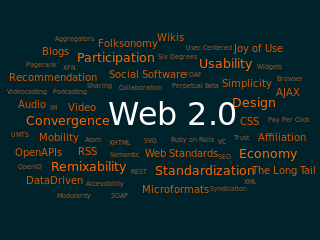A blog is a discussion or informational website published on the World Wide Web consisting of discrete, often informal diary-style text entries (posts). Posts are typically displayed in reverse chronological order, so that the most recent post appears first, at the top of the web page. Until 2009, blogs were usually the work of a single individual, occasionally of a small group, and often covered a single subject or topic. In the 2010s, "multi-author blogs" (MABs) emerged, featuring the writing of multiple authors and sometimes professionally edited. MABs from newspapers, other media outlets, universities, think tanks, advocacy groups, and similar institutions account for an increasing quantity of blog traffic. The rise of Twitter and other "microblogging" systems helps integrate MABs and single-author blogs into the news media. Blog can also be used as a verb, meaning to maintain or add content to a blog.
Knowledge management (KM) is the process of creating, sharing, using and managing the knowledge and information of an organisation. It refers to a multidisciplinary approach to achieving organisational objectives by making the best use of knowledge.
Social software, also known as social apps, include communication and interactive tools often based on the Internet. Communication tools typically handle the capturing, storing and presentation of communication, usually written but increasingly including audio and video as well. Interactive tools handle mediated interactions between a pair or group of users. They focus on establishing and maintaining a connection among users, facilitating the mechanics of conversation and talk. Social software generally refers to software that makes collaborative behaviour, the organisation and moulding of communities, self-expression, social interaction and feedback possible for individuals. Another element of the existing definition of social software is that it allows for the structured mediation of opinion between people, in a centralized or self-regulating manner. The most improved area for social software is that Web 2.0 applications can all promote cooperation between people and the creation of online communities more than ever before.
Organizational learning is the process of creating, retaining, and transferring knowledge within an organization. An organization improves over time as it gains experience. From this experience, it is able to create knowledge. This knowledge is broad, covering any topic that could better an organization. Examples may include ways to increase production efficiency or to develop beneficial investor relations. Knowledge is created at four different units: individual, group, organizational, and inter organizational.

Knowledge transfer refers to sharing or disseminating of knowledge and providing inputs to problem solving. In organizational theory, knowledge transfer is the practical problem of transferring knowledge from one part of the organization to another. Like knowledge management, knowledge transfer seeks to organize, create, capture or distribute knowledge and ensure its availability for future users. It is considered to be more than just a communication problem. If it were merely that, then a memorandum, an e-mail or a meeting would accomplish the knowledge transfer. Knowledge transfer is more complex because:
Spam in blogs is a form of spamdexing. It is done by posting random comments, copying material from elsewhere that is not original, or promoting commercial services to blogs, wikis, guestbooks, or other publicly accessible online discussion boards. Any web application that accepts and displays hyperlinks submitted by visitors may be a target.
Fle3 is a Web-based learning environment or virtual learning environment. More precisely Fle3 is server software for computer supported collaborative learning (CSCL).

Gamasutra is a website founded in 1997 that focuses on all aspects of video game development. It is owned and operated by UBM Technology Group, a division of UBM and acts as the online sister publication to the print magazine Game Developer.
Social computing is an area of computer science that is concerned with the intersection of social behavior and computational systems. It is based on creating or recreating social conventions and social contexts through the use of software and technology. Thus, blogs, email, instant messaging, social network services, wikis, social bookmarking and other instances of what is often called social software illustrate ideas from social computing.
Weblogs, Inc. was a blog network that published content on a variety of subjects, including tech news, video games, automobiles and pop culture. At one point, the network had as many as 90 blogs, although the vast majority of its traffic could be attributed to a smaller number of breakout titles, as was typical of most large-scale successful blog networks of the mid-2000s. Popular blogs included: Engadget, Autoblog, TUAW, Joystiq, Luxist, Slashfood, Cinematical, TV Squad, Download Squad, Blogging Baby, Gadling, AdJab, and Blogging Stocks.
In blogging, a ping is an XML-RPC-based push mechanism by which a weblog notifies a server that its content has been updated. An XML-RPC signal is sent from the weblog to one or more "Ping Server(s)" (as specified by the weblog) to notify a list of their "Services" of new content on the weblog.
This is a list of blogging terms. Blogging, like any hobby, has developed something of a specialised vocabulary. The following is an attempt to explain a few of the more common phrases and words, including etymologies when not obvious.
An online diary is a personal diary or journal that is published on the World Wide Web on a personal website or a diary-hosting website.
Corporate blog is a blog that is published and used by an organization, corporation, etc. to reach its organizational goals. The advantage of blogs is that posts and comments are easy to reach and follow due to centralized hosting and generally structured conversation threads. Although there are many different types of corporate blogs, most can be categorized as either external or internal.
An edublog is a blog created for educational purposes. Edublogs archive and support student and teacher learning by facilitating reflection, questioning by self and others, collaboration and by providing contexts for engaging in higher-order thinking. Edublogs proliferated when blogging architecture became more simplified and teachers perceived the instructional potential of blogs as an online resource. The use of blogs has become popular in education institutions including public schools and colleges. Blogs can be useful tools for sharing information and tips among co-workers, providing information for students, or keeping in contact with parents. Common examples include blogs written by or for teachers, blogs maintained for the purpose of classroom instruction, or blogs written about educational policy. Educators who blog are sometimes called edubloggers.
IBM Connections is a Web 2.0 enterprise social software application developed by IBM to provide online social networking tools for people associated with a company. The IBM collaboration suite, Notes / Domino, Sametime, Portal and Connections was sold to HCL technologies in December 2018.
Content creation is the contribution of information to any media and most especially to digital media for an end-user/audience in specific contexts. Content is "something that is to be expressed through some medium, as speech, writing or any of various arts" for self-expression, distribution, marketing and/or publication. Typical forms of content creation include maintaining and updating web sites, blogging, article writing, photography, videography, online commentary, the maintenance of social media accounts, and editing and distribution of digital media. A Pew survey described content creation as the creation of "the material people contribute to the online world."
Mobile blogging is a method of publishing to a website or blog from a mobile phone or other handheld device. A moblog helps habitual bloggers to post write-ups directly from their phones even when on the move. Mobile blogging has been made possible by technological convergence, as bloggers have been able to write, record and upload different media all from a single, mobile device. At the height of its growth in 2006, mobile blogging experienced 70,000 blog creations a day and 29,100 blog posts an hour. Between 2006 and 2010, blogging among teens declined from 28% to 14%, while blogging among adults over 30 increased from 7% to 11%. However, the growing number of multi-platform blogging apps has increased mobile blogging popularity in recent years creating a brand new market that many celebrities, regular bloggers and specialists are utilizing to widen their social reach.
While the term "blog" was not coined until the late 1990s, the history of blogging starts with several digital precursors to it. Before "blogging" became popular, digital communities took many forms, including Usenet, commercial online services such as GEnie, BiX and the early CompuServe, e-mail lists and Bulletin Board Systems (BBS). In the 1990s, Internet forum software, such as WebEx, created running conversations with "threads". Threads are topical connections between messages on a metaphorical "corkboard". Some have likened blogging to the Mass-Observation project of the mid-20th century.
The Black Weblog Awards is an online awards event which recognizes bloggers of African-American descent for their contributions in blogging, video blogging, and podcasting. The Black Weblog Awards started in 2005 with 11 categories, and has now grown to include 36 categories. Former Black Weblog Award winners include blogger and radio host B. Scott, comedian and YouTube personality Elon James White, comedian, television host, and New York Times best-selling author Baratunde Thurston, LGBT activist and media personality Keith Boykin, hip-hop artists D-Nice and Kanye West, musician and DJ Questlove, and model/media personality Tyra Banks. Other Black Weblog Award winners have also appeared in traditional media outlets, such as the Washington Post, the Los Angeles Times, and NPR.



